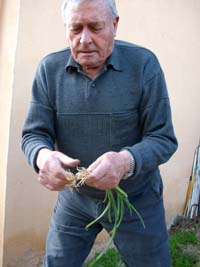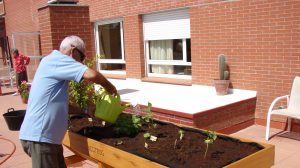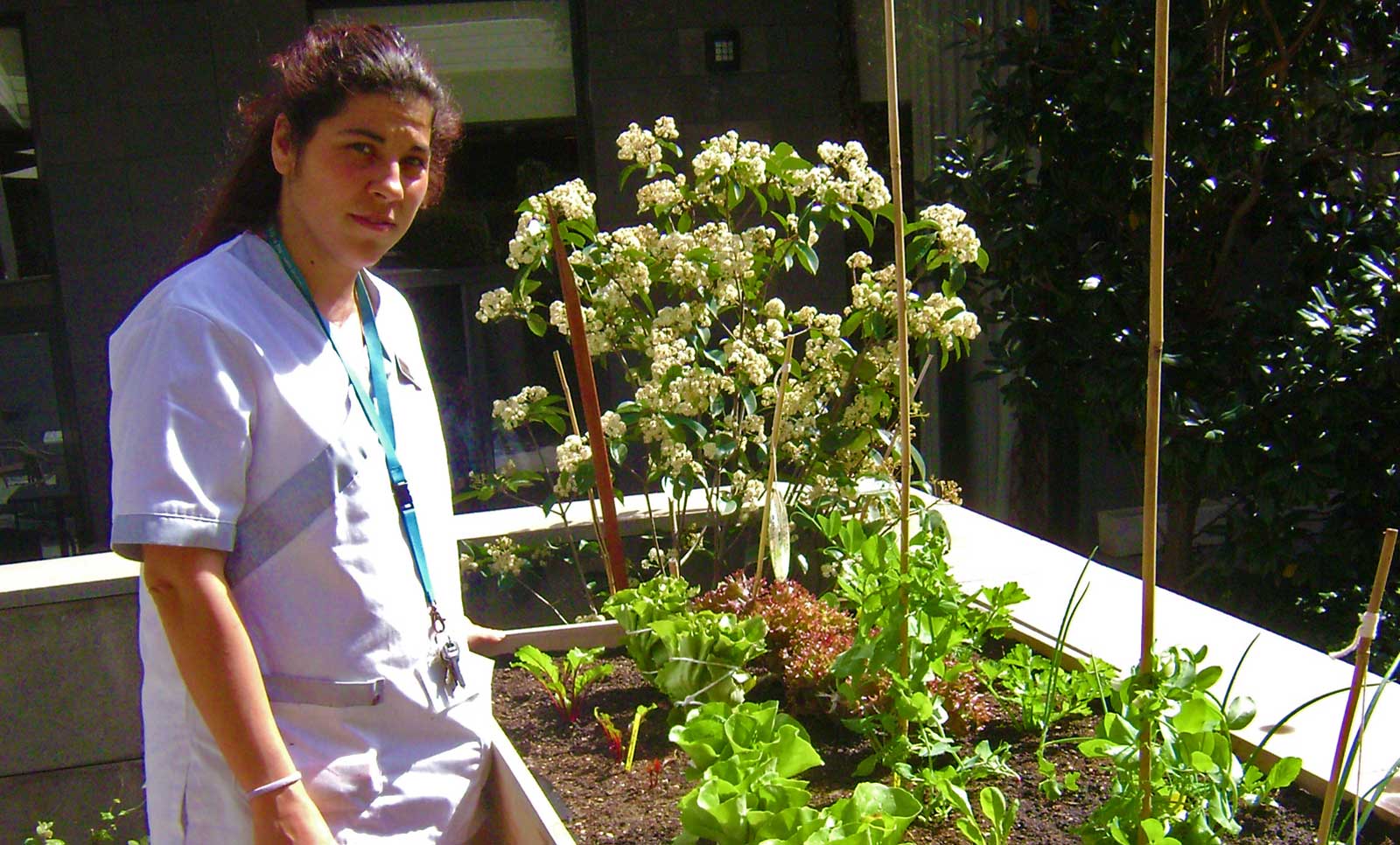Vegetable gardens in care homes
Our urban garden service takes into account the specific needs of each person or group. We offer solutions, materials and working programmes adapted to the disabled and wheelchair users, people with back problems or simply in places with limited space. We only promote organic farming for health reasons, which as we all know doesn’t use toxic products.
We strongly believe in the benefits of horticulture and with our “elderly, gardening and health” project we feel we contribute to the welfare of the older generations.
After working closely with Sanitas and having older family with gardens, we understand gardening as a positive activity for retirees. Within society, the coordination between social field experiences and the professional work of farm technicians, has resulted in the idea of gardening as a positive activity of social therapy.
This in mind, Huertocity, designs and installs vegetable gardens in care centres for the elderly and provides all the necessary support to function properly.
The success of our project has been such that Sanitas Residencias contracted us to install vegetable gardens in 5 of its local care homes, and additionally provide materials for other homes across spain, from Bilbao to the Canary Islands
In Barcelona we installed Vegtrug raised beds with organic substrates, our own mix, and organic seeds and seedlings. Following this initial phase the therapists now work with the residents who take on some of the daily tasks of weeding, watering and of course harvesting the crops.
When necessary, we help Sanitas with specific seasonal jobs and any additional work that may be required following installation. The photo gallery has images the Sanitas generoulsy passed to us. For privacy reasons residents aren’t featured
Below is a quote from Silvia, one of the therapists at Sanitas:
La actividad del huerto es una actividad que nos permite poder trabajar desde muchas áreas con el residente con gran diversidad de perfiles.
– Área cognitiva: Se trabaja la memoria, la atención, las funciones ejecutivas, las rutinas, los hábitos, etc. También trabajamos la reminiscencia con aquellos residentes que ya han tenido huerto y que compartan con el resto de residentes las tareas que realizaban y como se tiene que plantar o cosechar. En residentes que no tienen unos hábitos instaurados, podemos trabajar a través de el riego diario las rutinas de regarlo y así lo involucramos y lo hacemos participe de una tarea de la residencia, dándola una responsabilidad asumible. Nosotros cambiamos de responsables una vez cada dos meses, más o menos, a no ser que el residente quiera dejar la tarea antes.
– Área fís ica: Trabajamos la tolerancia, la fuerza, la motricidad fina, la motricidad gruesa, las amplitudes articulares, etc. dando así un perfil de residentes con una discapacidad física o limitación. Podemos plantar, cosechar, recortar, colocar semillas, poner tierra, etc.
ica: Trabajamos la tolerancia, la fuerza, la motricidad fina, la motricidad gruesa, las amplitudes articulares, etc. dando así un perfil de residentes con una discapacidad física o limitación. Podemos plantar, cosechar, recortar, colocar semillas, poner tierra, etc.
-Área emocional: Se mejora la autoestima y la relación con los demás residentes. Se trabaja el logro, cuando se realiza la cosecha y los demás residentes prueban el producto con el que han estado trabajando. Les gusta mucho y lo comparten con los demás. El saber que pueden compartir con sus compañeros sus conocimientos les hace poder integrarse mejor en el grupo y sentirse parte de él.
También residentes que no suelen participar en actividades o suelen estar en la habitación, están pendientes del crecimiento de la cosecha. Es una actividad muy completa.
Our main goal with the “elderly, gardening and health” project is to contribute in improving the quality of life of residents. The factors that influence and the benefits derived from it are many, some of which have been mentioned above by Silvia, and others include:
Environmental factors
– Improve the landscape and environ through the diversification of the vegetation in the area.
– Non-toxic production of healthy vegetables.
Relationships
– Share in a fun atmosphere of cooperation and encouraging group interaction.
– Combat isolation and promote the outdoors.
Subjective welfare factors
– Enhancing personal skills to promote independence and self-realization.
– Encourage recognition of a successful identity. Promote autonomy.
– Create workspaces to break the routine and encourage excitement.
– Acquire new or recuperate “forgotten” knowledge.
– Fighting, uprooting and recovering fond memories as the vast majority of seniors have spent most of their lifes in contact with agriculture, especially during childhood.
– Encourage activity. Prevent depression and frustration.
Material factors
– Educate to promote the maintenance of health by encouraging the consumption of vegetables in the diet.
– Encourage physical and psychological abilities (cognitive, motor and sensory-perceptual):
– Functional capabilities: Maintain joint mobility. Strengthen the muscles. Work coordination.
– Motor skills: Working fine motor / gross. Encouraging coordination. Encourage skill.
– Perceptual skills: Work: The spatial orientation. Temporal orientation. Discrimination (visual, tactile, olfactory …)
– Cognitive skills: Encourage: Attention. Memory. Foresight. Sequencing.
Write to us or call us for more details.
Benefits of a vegetable garden
There are many reasons for you to have a vegetable garden…










